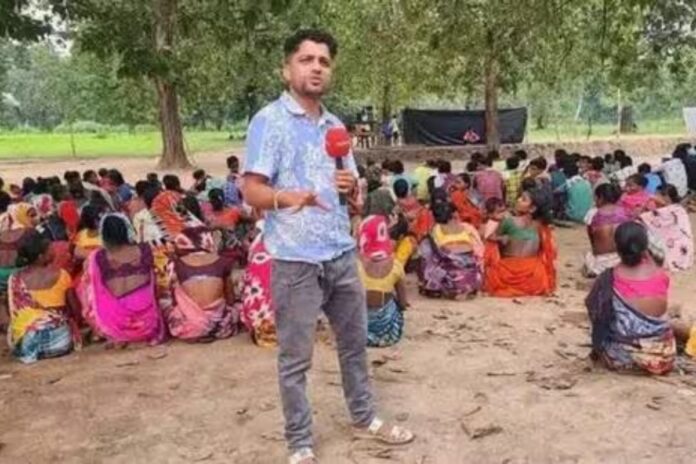A missing journalist, Mukesh Chandrakar, 28, who disappeared on January 1 in Chhattisgarh, was found dead in a septic tank in Bijapur district. Chandrakar, known for his fearless reporting on sensitive issues in the Bastar region, had established himself as a prominent journalist through his work with NDTV and his independent YouTube channel, Bastar Junction. His death has sparked widespread outrage and calls for justice.
Discovery Of The Journalist’s Body
The investigation into Chandrakar’s disappearance began when his brother, Yukesh, also a journalist, reported him missing on January 2. Mukesh had last been seen after receiving a call from a local road contractor’s cousin, requesting a meeting. After failing to return home and having his phones switched off by 12:30 am, his absence raised suspicions.
Police traced Mukesh’s last known location to the property of a contractor, Suresh Chandrakar, in Chattanpara Basti, Bijapur. Upon inspecting the site, officers discovered a recently sealed septic tank. Breaking it open, they found Mukesh’s body with visible injuries to the head and back, suggesting a violent attack. The tank’s sealing and Mukesh’s injuries indicate a deliberate attempt to conceal the murder.
Superintendent of Police Jitendra Yadav confirmed, “We are interrogating all individuals connected to the property, including the contractor, Suresh Chandrakar. The investigation will consider all angles, including whether the crime is related to the journalist’s work.”
Mukesh Chandrakar’s Legacy
Mukesh Chandrakar was not just a journalist but a symbol of fearless reporting in the volatile Bastar region, a known hotspot for Maoist activity. In April 2021, Mukesh played a pivotal role in securing the release of CRPF commando Rakeshwar Singh Manhas, who had been taken hostage by Maoists. His efforts were recognized by the state police, marking him as an essential figure in mediating sensitive issues.
Through his YouTube channel, Bastar Junction, Mukesh provided an independent platform to highlight stories of local significance, often addressing underreported topics. This commitment to uncovering the truth, even at personal risk, earned him respect among his peers but may also have made him a target.
Impact On Family And Colleagues
Mukesh’s untimely death is a devastating loss for his family, especially his brother, Yukesh. The siblings, who lost their parents at a young age, shared a close bond and a passion for journalism. “My brother was committed to his work and often faced challenges because of his integrity,” Yukesh shared.
Colleagues across the journalism fraternity have expressed their grief and anger. NDTV’s resident editor, Anurag Dwary, remarked, “As a journalist, my colleague paid the ultimate price for exposing the truth. This is a stark reminder of the risks journalists take daily. We demand a swift and impartial investigation to bring those responsible to justice.”
Political Reactions And Promises Of Justice
Mukesh’s murder has drawn sharp criticism from political leaders, who have condemned the incident as a grave attack on democracy and press freedom. Chhattisgarh Chief Minister Vishnu Deo Sai stated, “This is an irreparable loss to journalism and society. The culprits will not be spared, and the authorities have been instructed to arrest the accused and ensure the strictest punishment.”
Chhattisgarh Congress president Deepak Baij criticized the deteriorating law and order situation, emphasizing that journalists are increasingly at risk. “This horrific spree of violence is now targeting the fourth pillar of democracy. Journalists are paying with their lives for impartial reporting. The state must take stronger steps to protect the media,” he said.
A Call For Accountability
Mukesh Chandrakar’s tragic demise has cast a spotlight on the dangers faced by journalists, especially in conflict-ridden areas. His fearless pursuit of truth, even in the face of threats, serves as a stark reminder of the sacrifices made by reporters to uphold transparency and accountability.
While his colleagues vow to continue his legacy, the demand for justice is growing louder. Mukesh’s story is not just a call for action but a plea for the protection of press freedom in regions where speaking the truth can be life-threatening. The ongoing investigation is expected to shed light on the motives behind his murder and ensure those responsible are held accountable.

